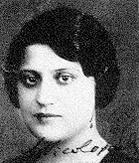Dido Sotiriou
Dido Sotiriou (alternative spelling: Dido Sotiriu ; Greek Διδώ Σωτηρίου ; Turkish Dido Sotiroğlu; * February 18, 1909 or according to other sources: * 1911 in Aydın , Ottoman Empire ; † September 23, 2004 in Athens ) was a Greek writer.
Life
Sotiriou was the daughter of an originally wealthy polyglot bourgeois family who lived in a stately home in Smyrna (today: İzmir ) or in Aydın. Her childhood, Sotiriou said, seemed like an "endless fairy tale". She had two older and two younger siblings. When the father, an entrepreneur, went bankrupt and the family became impoverished, Dido was sent to her wealthy uncle and his wife in Athens at the age of about eight, who they subsequently raised. Sotiriou later described this separation from her family as "my first refugee existence".
During the population exchange between Greece and Turkey after the Greco-Turkish War in 1922, the Sotirious family also had to leave Smyrna and landed in the port of Piraeus , where the father worked as a clerk in the docks and on ships.
In Athens she was raised in her aunt's house in an affluent, middle-class milieu. However, as she herself said, she developed a strong sense of social injustice, especially due to the contrast between her own privileged life situation and the humble circumstances in which her parents or siblings had to live. She reported to the union and so came to the left movement. In 1933 she joined the anti-fascist front. In 1935 she began her career as a journalist. She fought against the dictatorship of Ioannis Metaxas and later, during the time of the German occupation, worked for an anti-fascist newspaper.
Sotiriou stated in an interview in 1989 that she had always been "on the left wing" since she began her political commitment in 1932. She is proud to have given up her fortune and turned down her aunt's inheritance with the aim of being free and being able to do what she wants.
On trips to Paris she met writers like André Malraux , André Gide and Louis Aragon . In the 1950s she began to write literary herself “to tell the truth”.
Her first novel was published in 1959, followed by “Bloody Earth” in 1962 (“Ματωμένα χώματα”; title of the German edition: “Greetings to the earth that gave birth to both of us”), her greatest success. The book is about the trauma of the expulsion of the Greeks from Asia Minor. In the foreword, Sotiriou mentions that she wrote the novel on the basis of notes made by a farmer in Asia Minor named Manolis Axiotis, who witnessed the events as an eyewitness. From his point of view, the book is written in the first person. It was also very well received in Turkey, probably because, as the author said, “there are no good Greeks and no bad Turks, only people who become victims and pay dearly for them”.
She dealt with the time of the civil war and the intrigues of the secret service against Greek democracy in the novel “Gebot” (“Εντολή”) published in 1976. It describes the fate of the communist resistance fighter Nikos Belogiannis , who was executed in 1952 and married to Sotiriou's sister, Elli Pappa .
Sotiriou was the editor-in-chief of a women's magazine and foreign policy commentator for various newspapers. As a novelist, she has received many awards. She died of pneumonia over the age of 90.
The Dido Sotiriou Prize is named after her .
Works
- Say hello to the earth that gave birth to both of us . Romiosini Verlag , Cologne 1994 (2nd edition), ISBN 3-923728-13-1 . In the publishing house Edition Romiosini new edition 2016 e-book and epub under the title Lebewohl, Anatolien , ISBN 978-3-946142-11-9
- The commandment . Romiosini Verlag, Cologne 1992, ISBN 3-923728-61-1 . In the Verlag Edition Romiosini 2018 new edition e-book and epub under the title The Order . ISBN 978-3-946142-49-2
literature
- Story of a woman (interview with Dido Sotiriou for the Greek edition of the magazine Marie Claire , issue 6, May 1989), printed in: Niki Eideneier , Arzu Toker (ed.): Kalimerhaba (Greek-German-Turkish reading book) . Romiosini, Cologne 1992, ISBN 3-923728-53-0 , pages 579 to 588 (German translation) and 560 to 569 (original Greek text)
Web links
- Literature by and about Dido Sotiriou in the catalog of the German National Library
- Literature by and about Dido Sotiriou in the bibliographic database WorldCat
- unisolo.de
Individual evidence
-
↑ see for example the entry about Sotiriou, Διδώ Σωτηρίου in the Greek-language Wikipedia:
or the short biography in the book "Kalimerhaba" (see section literature ), page 808 - ↑ D. Sotiriou in the interview “History of a Woman” (see section Literature ), page 581
- ↑ D. Sotiriou in the interview “History of a Woman” (see section Literature ), page 582
- ↑ D. Sotiriou in the interview “History of a Woman” (see section Literature ), page 583 f.
- ↑ Sophia Georgalidis on Bruecke-Saarbruecken.de
| personal data | |
|---|---|
| SURNAME | Sotiriou, Dido |
| BRIEF DESCRIPTION | Greek writer |
| DATE OF BIRTH | February 18, 1909 |
| PLACE OF BIRTH | Aydın , (Turkey) |
| DATE OF DEATH | September 23, 2004 |
| Place of death | Athens |
